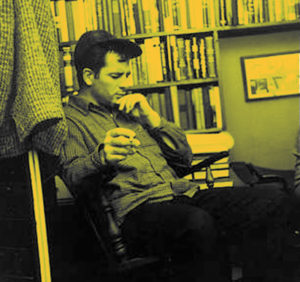
American writer Jack Kerouac in 1959
…the only people for me are the mad ones, the ones who are mad to live, mad to talk, mad to be saved, desirous of everything at the same time, the ones who never yawn or say a commonplace thing, but burn, burn, burn like fabulous yellow roman candles exploding like spiders across the stars and in the middle you see the blue centerlight pop and everybody goes “Awww!” – Jack Kerouac, On the Road
When I was about 17, I found the Jack Kerouac novel “On the Road” on the shelf of a second-hand bookstore. I was young, restless, in need of adventure. The book title appealed to me. On the road. How wonderful!
The book turned out to be a fictionalized version of Kerouac’s journey across America with his beer-chugging, pot-smoking, poetry-writing hippie friends.
I fell in love with Jack Kerouac and the Beatniks. Because of Kerouac I was also introduced to the powerful, charged poetry of Allen Ginsberg, also a core member of the Beat Generation.
How much I wanted to be like them – to drink & smoke pot & rebel against the establishment & cross America in a rundown truck.
More importantly, I wanted to write like them.
For a while I even learned to punctuate like Ginsberg (and that meant replacing “and” with “&” in all my sentences). I also dreamed of traveling to India, because that was where Ginsberg wrote his famed Indian Journals (I still haven’t been there, but I will one day).
I saw the best minds of my generation destroyed by madness, starving hysterical naked,
dragging themselves through the negro streets at dawn looking for an angry fix,
angelheaded hipsters burning for the ancient heavenly connection to the starry dynamo in the machinery of night,
who poverty and tatters and hollow-eyed and high sat up smoking in the supernatural darkness of cold-water flats floating across the tops of cities contemplating jazz… – Allen Ginsberg, Howl
It was many years later that I realized – it was a good thing I’d fallen in love with these writers, and then later with writing itself.
Because that was the beginning of my training to becoming a better writer.
Since then writing has become one of the most important skills I possess.
Even as a photographer, writing has remained an important part of my work. In my photo project Creative People + Projects, I accompany my photographs and portraits with my writing. Without my writing I don’t think I would have been able to fulfill what I wanted to achieve with the project.
I can only now share with you all that I’ve learned because I learned how to write well early on.
At this point, I just want to throw it out there: Writing isn’t for everyone. If this isn’t a topic that interests you, feel free to skip this article. But if you are a creative or a creative entrepreneur who wants to sharpen your writing skills (or you have a faint intuition that writing is somehow a good skill to possess), then read on.
I’m not saying I’m an expert at writing, but I have learned a thing or two about writing over the last ten years, and I’m happy to share these lessons with you.
*
Write for what?
Let’s be honest. Most of us don’t want to be novelists or poets. You are probably reading my blog because you are interested in living life on your own terms or becoming a successful freelancer or a creative entrepreneur.
You want to learn to write better, but the purpose isn’t to indulge in your very private artistic passions. You want to write better so you can market yourself better, get more jobs, earn more money.
Examples: Maybe you are an aspiring photographer looking to add writing as another dimension to your work. Maybe you are looking to improve the writing of your “about” page on your website. Maybe you want to send a convincing sales email to a potential client. Maybe you want to spruce up your bio on your resume.
In other words, marketing.
I understand that “marketing” can sound like a dirty word to creatives, but all “marketing” does is to let potential clients or customers understand what is so awesome about you that they must hire you / buy from you. Which is super awesome!
And we’re lucky because we have the Internet. The Internet has liberated us, broken down all walls. Singer-songwriters don’t need to get signed to labels anymore – they have Youtube. Photographers can chalk up thousands of followers on Instagram and other photo-sharing platforms and directly attract the attention of photo editors and photo buyers who are also themselves on the very same platforms. Writers can start publishing their own blogs in ten minutes. Or start writing immediately on websites like Medium.
If you learn to write, you get to tell your own stories in your own words and sculpt the public’s (and your potential clients’) imagination and perception of you.
If you can’t write well, you can of course hire someone to do it for you. But who knows you better than you?
So start making use of the Internet to write and market yourself.
Let people know that you exist. Doing good work in a quiet corner of the universe isn’t going to bring you far enough anymore.
*
Everyone can learn to write well, even if they think they can’t
I understand that writing can be a difficult thing for many people to do. When people think of writing, they think of this thing that only some particularly talented people can do.
That’s not true.
And we are not asking you to write like Shakespeare.
Without further bullshit, let’s get to some actionable steps on how to become a better writer (even if you don’t normally write):
(1) You suck at writing. Start writing anyway.
Most people think they are bad writers. They are ashamed of what they write about, or they think their writing reflects badly on them. Write anyway.
The act of writing itself exercises your writing muscles.
It’s just like how the more you run, the better you get at running.
Write and write and write. Slowly and surely you will get better.
(2) Use simple words.
There is this misconception that good writing is made up of flowery language. That can’t be further from the truth.
There are probably as many definitions of good writing as there are people, so I cannot define good writing for you here.
But for our purposes of writing to market ourselves, to write well is to bring our points across successfully.
To do that, you don’t need a huge vocabulary.
Chances are, you know enough English words to write an entire book without searching up the dictionary.
Use the words you already know to bring your point across. Some of the best writing in the world are made up of simple vocabulary and short sentences (check out Raymond Carver’s works to know what I mean).
(3) Economy is beauty.
Ruthlessly edit your writing. Cut out the fluff.
James Althucher famously said, “Write whatever you want. Then take out the first paragraph and last paragraph.”
I think he’s trying to say that sometimes less is better.
You can ramble on and on, but it isn’t going to make your writing better if your audience doesn’t get your message.
Take out all the flowery descriptions and all the unnecessary stories. Strip your writing down until you are left with what you really want to say. You will be amazed at how effective your writing can be if you do that.
(Unless you are writing poetry, then ramble all you want. It’s your poem, not mine!)
(4) Tell the truth or speak from your own experience.
We often think it’s difficult to write because we have no idea where to start, or we think we have no material. Well, start from the truth. Your life is your material (that’s why it’s so important to live an interesting life!). Be honest. Be brutally honest if you can, and be real. No one has tolerance for fakery and hypocrisy these days. Don’t pretend to have an opinion if you don’t have one (and if you do have an opinion, don’t be afraid to share it even if it’s an unpopular one).
(5) Read.
I don’t think it’s quite possible to become a better writer if you don’t read. But don’t just read any writer. Read good books. You can Google for reading lists and book recommendations online. People on the Internet have read through thousands and thousands of books and come up with must-read lists for you – make use of them! You also don’t have to read only books. There are a ton of good writing online. If you are lost and don’t know where to start, follow my reading recommendations in the Resources section below. If you read all of my recommended books/links you will almost certainly become a better writer.
(6) Imitate your favorite writer(s).
Find a writer you like. No, if you can, find a writer you LOVE, and imitate the hell out of him or her. The truth is, we all want to write like our favorite writers. Find that writer whose sentences make your heart skip a beat. When you write, pretend you are that writer. Put yourself in his or her head. After some time, you will slowly find your stride and develop your own style.
(7) Write for an audience.
If you do this, you have the chance to receive feedback for your writing. Even if you don’t, knowing that people are reading will make you put in more effort into your writing. Intentional practice works wonders. Even though blogs are deemed to be pretty old-fashioned these days, start one and make your friends and family read it. Who knows, maybe in time you might even attract an audience.
(8) Write like how you talk.
The best way to start writing is to write like how you talk. Try it. It will liberate you from all your worries of not having a “personal style” and will get you to actually start… writing, which of course is the most important thing you need to do if you want to improve your writing.
*
So there you have it.
Simple, actionable advice for non-writers. Practice them. You might not become the next Ernest Hemingway if you follow the above advice, but you will most likely become a much better writer.
*
Resources
Here are some resources that will help with your writing. I love all of the following writers and I’ve selected them because they all write powerfully and beautifully, and share a certain effective economy of style.
Books on writing:
On Writing – Stephen King
Bird by Bird – Anne Lammott
What I Talk About When I Talk About Running – Haruki Murakami
Blogs:
Zen Habits
The Minimalists
Derek Sivers
James Altucher
Ryan Holiday
Writers:
Ernest Hemingway
Raymond Carver
Haruki Murakami
Good luck with your writing, and drop me a note if you want to open a conversation about this subject.
To end off…
“All you have to do is write one true sentence. Write the truest sentence that you know.” – Ernest Hemingway

